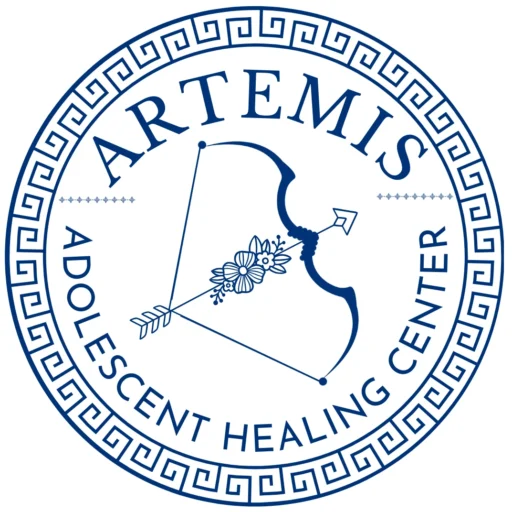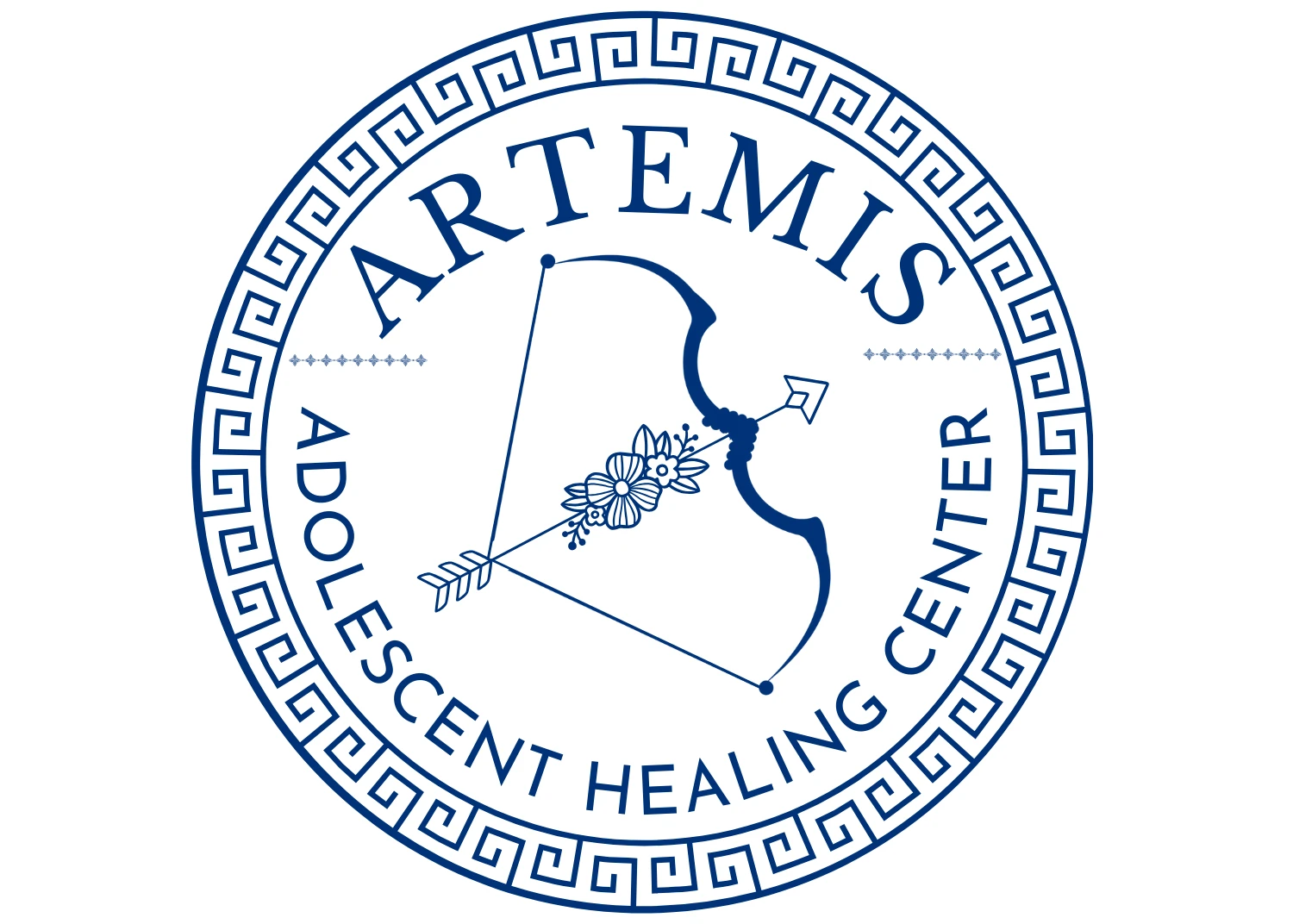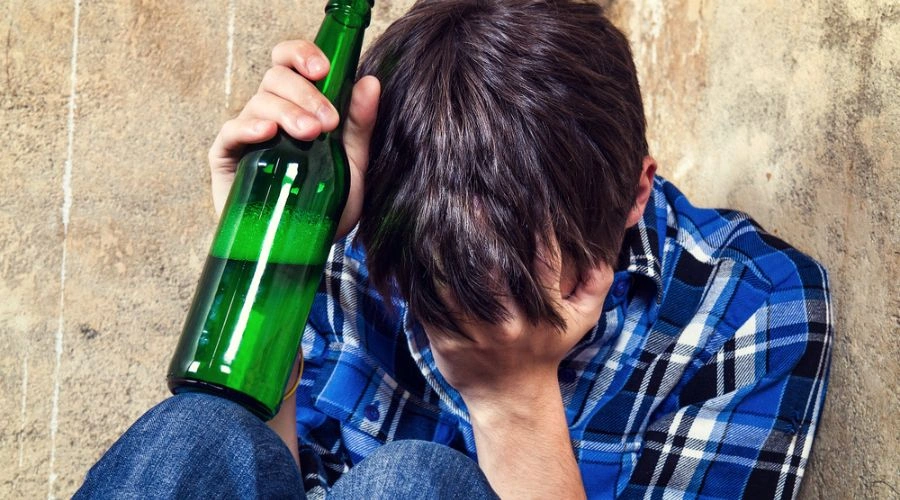Examining the Risks of Alcohol Dependence for Young People
Parents are often caught by surprise at how early teens start drinking alcohol or engaging in drug use. Teen addiction is a nationwide problem that parents can’t wishfully imagine doesn’t exist. But why are teenagers more prone to alcohol abuse than adults?
Adolescent brain development means that the brain has not fully matured, but the drive to fit into certain social environments can occur at this age. By the time they reach puberty, children may also develop psychological factors that cannot go untreated. Alcohol consumption during adolescence puts these kids at increased risk for other mental health issues later in life.
The teen addiction experts at Artemis Adolescent Healing Center understand how the developing brain is susceptible to teen drug use. We customize treatment plans to help restore order to the brain’s reward system to help adolescents recover from addictive behaviors.
Keep reading for a full explanation of how teens experiencing alcohol use disorder differ from adults, and how treatment can help avoid the long-term consequences of substance use disorder.
Get Effective Detox and Rehab Options at Artemis
Adolescent Brain Development and the Effects of Alcohol Abuse
The teenage brain continues to develop until they become young adults, especially in the pre-frontal lobes – the region that helps us make good decisions, use our judgment, and have impulse control. When teens drink alcohol before their pre-frontal lobes have matured, it can interfere with brain function. Alcohol consumption during adolescence can lead to long-term mental health issues, like depression, anxiety, or substance use disorders.
Teen Alcohol Consumption, Decision Making, and Impulse Control
Because of their immature brains, teens are more likely to be impulsive than adults. The dopamine system in their brain is already active, which means they seek rewards without wholly understanding the possible fallout of their choices. That can lead to poor decision-making and impulse control problems.
Alcohol Misuse and Risk Taking
Teenagers who drink alcoholic beverages often engage in risky behaviors. These can include reckless driving, vandalism, having unprotected sex, or even violent behavior. Drinking during the teenage years can impact the part of the brain that evaluates the possible consequences of actions, leading to serious problems that result from repercussions that can follow them for years.
Deciding to Drink Alcohol Because of Peer Pressure
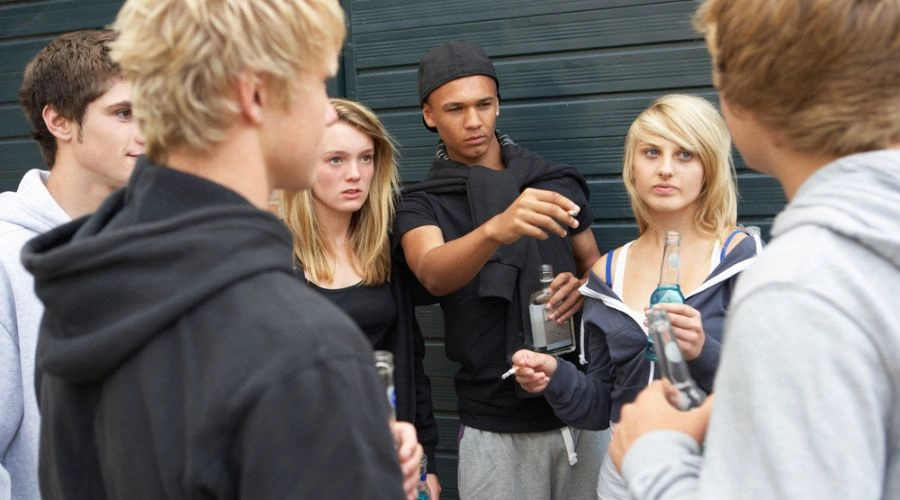
Middle schoolers and high school students want to fit in with their peers. Misusing alcohol can be a tool some use to climb their school’s social ladder. When the most socially successful and popular students in the school behave a certain way, many others emulate the behavior to try to gain the same outpouring of admiration or respect.
Besides peers who drink alcohol and use other substances, teens may see partying glorified by social media influencers. Check out their favorite social media app and take a peek at the influencers who get clicks and likes for their irresponsible behaviors and total lack of self-control.
Hidden and Binge Drinking in This Age Group
Many teenagers who drink alcohol do so secretly. They may sequester themselves in their bedrooms or spend more time away from the house and family members than they used to. You may chalk these changes up to emerging adulthood, and they can be. However, having these behaviors on your radar as a parent is critical to early decision-making on preventative steps.
They may also binge. Binge drinking means consuming large amounts of liquor in a short time, often five or more drinks in about two hours. The suddenly higher blood alcohol levels expose adolescents to the dangers of alcohol poisoning, accidents, alcohol-induced blackouts, or even sexual assault. Parents may notice alcohol odors, unexplained fatigue, or moodiness.
Get Accredited Treatment Programs at Artemis
Teen Substance Use Is a Pervasive Issue in The USA
National Institute on Alcohol Abuse and Alcoholism (NIAAA) research shows the widespread nature of young people aged 12 to 20 drinking alcohol across the United States:
- 12.6% or 33.1% admitted to experimenting with alcohol consumption at least one time.
- 10.6 million (27.9%) reported alcohol consumed within the past year.
- 5.6 million (14.6%) admitted to drinking alcohol in the past month.
- 3.3 million (8.6%) reported binge drinking in the past month.
- Teen addiction accounts for about 3% of all alcohol use in the United States.
These numbers are a wake-up call for many parents concerned about drug and alcohol use on their teens’ brains. Rightfully so. Many youth have taken their first drink by the very young age of 12. Alcohol dependence can grow from experimenting and become an alcohol addiction without appropriate early intervention strategies.
Signs Adolescent Alcohol Use Has Become a Coping Mechanism
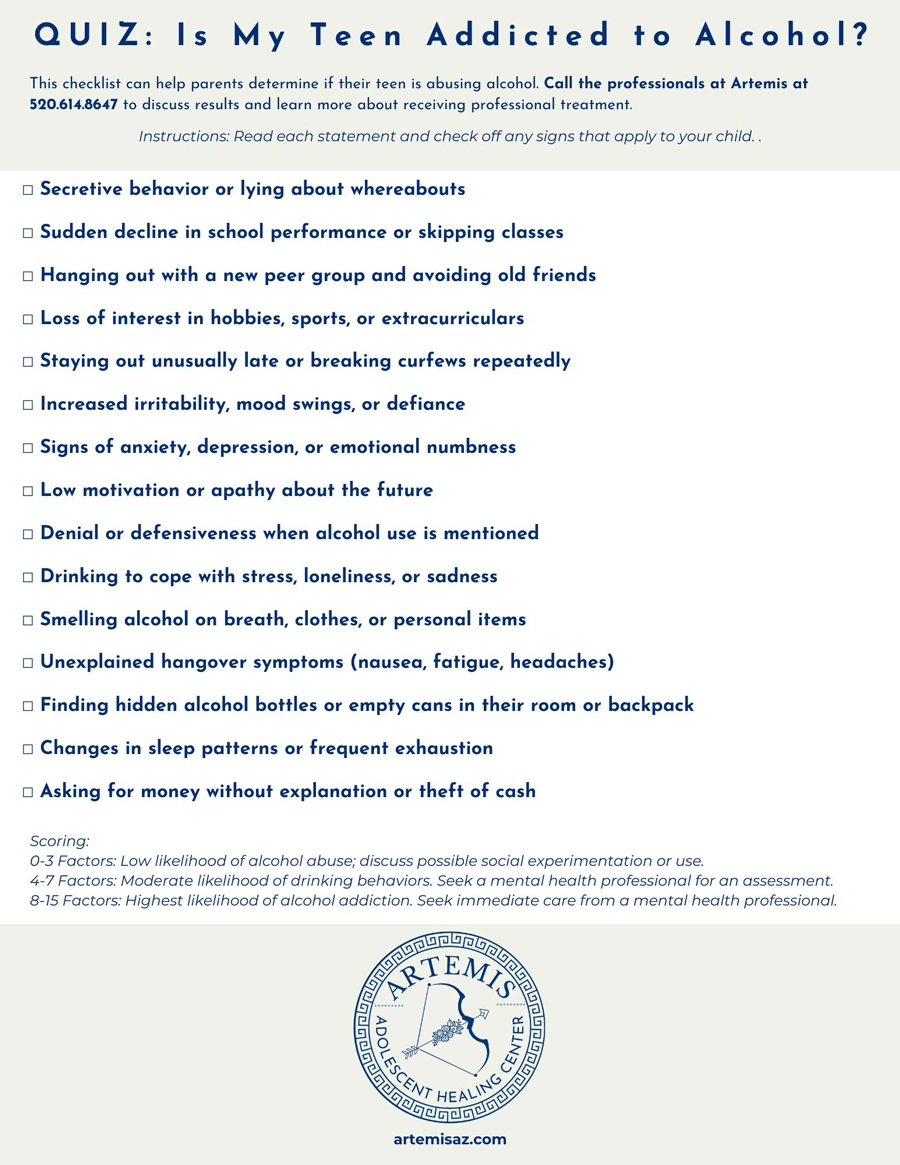
Teens are more likely to turn to alcohol use as a coping mechanism when they don’t know how to cope with overwhelming emotions. They are at a stage of emotional development where they may experience anxiety, depression, or persistent sadness. If a teen needs to take “just a few sips of wine” to prepare for a test, or has turned up intoxicated regularly, their teen brain development may be relying on drinking to self-soothe.
Emotional Development and Mental Health Disorder Risk Factors
Young people engaged in underage drinking may also have delayed emotional development. Some signs of this are difficulty with emotional regulation, extraordinary sensitivity to stress, or aggression. The behaviors can become more serious psychological factors later in life without help.
Depression, Anxiety, and Self-Medication
Depression and anxiety can bring tremendous emotional pain – even the adult brain can struggle to process them. Teens may not understand that alcohol affects them as a depressant, which can cause a worsening of symptoms with repeated use. The cycle of drinking to soothe their emotions, but they usually feel hungover and guilty afterwards, with the relief being very brief. That can lead them to use again. They may believe they can handle alcohol but don’t recognize their deterioration.
Trauma and Family History of Substance Abuse
Environmental factors, including a family history of drinking, can increase the likelihood of starting to drink during the teen years. Some families are predisposed to genetic factors that cause family members to fall into the trap of alcoholism. Alcohol impacts entire families, some of whom don’t recognize the long-term health risks.
How Parents Can Prevent Underage Drinking

As a parent, you may have more influence over your teen than you think. It’s up to you to discourage risky behaviors and disarm the peer pressure and contributing factors to alcohol addiction.
You’ve got this!
Discuss the Negative Consequences Honestly and Without Judgment
It takes honest conversations about the negative effects of alcohol to make lasting changes. But you must create a space where your child feels safe discussing their binge drinking or other behaviors.
Explain the real-life impacts, like decreased cognitive abilities, without lecturing or shaming them. Stick to the facts; ask your child their thoughts on the topic, and remain calm and non-judgmental when they give you a reply.
Set Boundaries and Rules
Make your expectations clear, achievable, and fair. Teens need routines and structures to help them make good choices and explain consequences for breaking the rules.
Discuss topics such as calling for a ride home if intoxication is an issue, curfews, and rules about keeping illicit drugs out of the house and away from siblings. Your rules can vary, depending on your family structure; the key is clarity.
Confront Mental Health Issues and Seek Professional Help

A teen who struggles with anxiety, trauma, depression, or behavioral concerns needs professional help to avoid self-medication and eventual alcohol or drug addiction.
Reaching out to a therapist, like the team at Artemis Healing Center, can provide your teen with the tools necessary for living a healthy, balanced life.
Don’t take our word for it. NIH research shows that early intervention is one of the best ways to end addiction to alcohol or drug use in all age groups.
Up To 100% of Rehab Costs Covered By Insurance
Find Effective Treatment at Artemis Adolescent Healing Center
The teen addiction treatment team at Artemis Healing Center provides each client with compassionate, professional care.
We’ve seen for ourselves how teens participating in binge drinking can develop addiction that causes untold harm into adulthood. Our therapists help teenagers age 13 and older with stopping addictive behaviors.
We work with most group and private health insurance plans to ensure our programs are accessible and affordable for families facing addiction. Call our admissions professionals for help understanding how to apply your insurance benefits to your child’s alcohol addiction treatment program.
